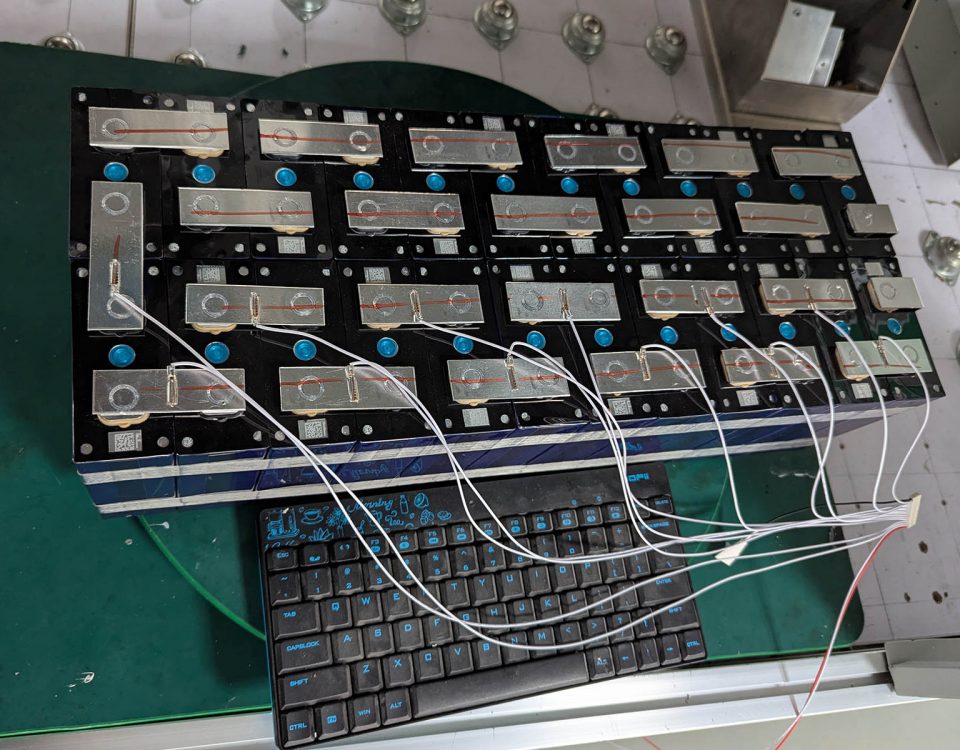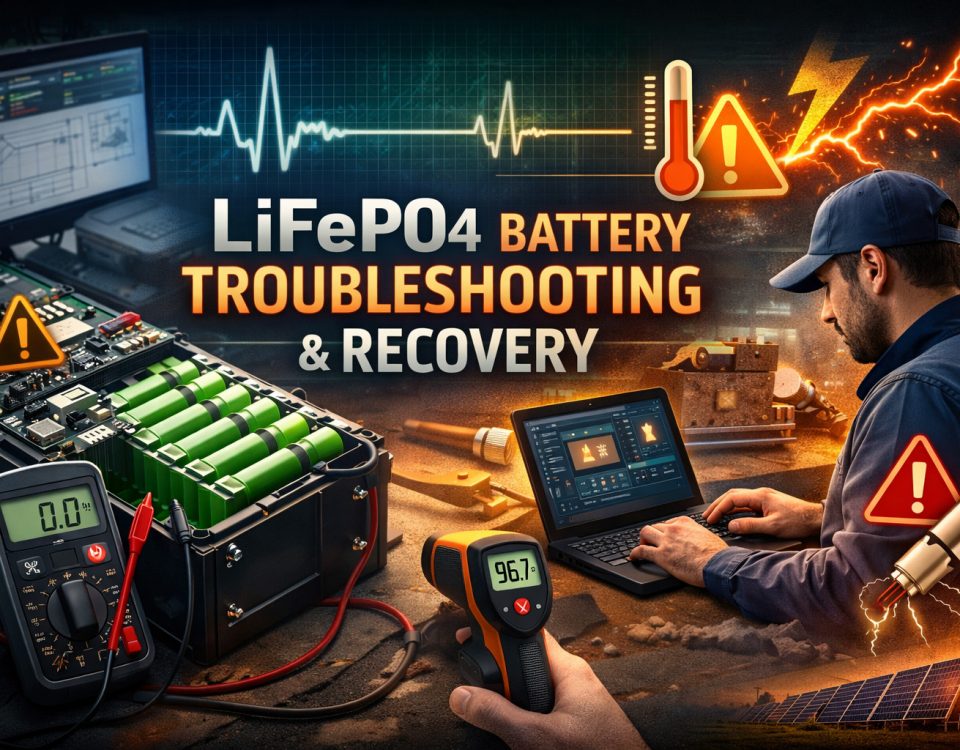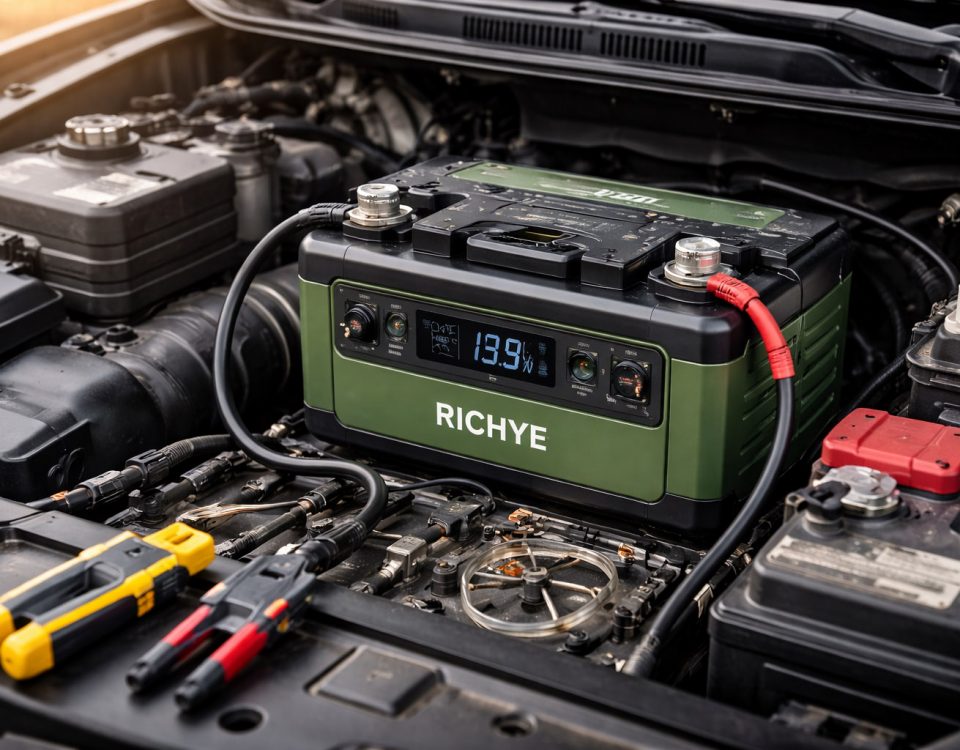Khi thế giới ngày càng chuyển đổi sang năng lượng tái tạo, sự kết hợp của pin lithium Và tấm pin mặt trời Đang trở thành nền tảng của các hệ thống năng lượng bền vững. Sự kết hợp giữa các công nghệ này có tiềm năng cách mạng hóa các giải pháp năng lượng cho cả hộ gia đình và doanh nghiệp, mở ra con đường hướng tới sự độc lập năng lượng cao hơn, chi phí thấp hơn và môi trường sạch hơn. Tuy nhiên, việc hiểu rõ cách kết hợp pin lithium với tấm pin mặt trời là điều cần thiết để tối ưu hóa hiệu suất, đảm bảo hoạt động ổn định và duy trì tính bền vững lâu dài.
Hướng dẫn này trình bày các yếu tố quan trọng cần xem xét khi kết hợp. pin lithium với tấm pin mặt trời, cung cấp cái nhìn sâu sắc về cách hai công nghệ này hoạt động cùng nhau và cách tận dụng tối đa sự kết hợp động lực này.
Tại sao pin lithium và tấm pin mặt trời là sự kết hợp hoàn hảo
Lý do chính là pin lithium Và tấm pin mặt trời Sự bổ sung hoàn hảo giữa hai công nghệ này nằm ở cách thức hoạt động của từng công nghệ.
-
Tấm pin mặt trờiTấm pin mặt trời tận dụng năng lượng mặt trời và chuyển đổi nó thành điện năng. Tuy nhiên, năng lượng mặt trời là nguồn năng lượng không liên tục — nó chỉ có sẵn khi mặt trời chiếu sáng. Đây là lúc pin lithium phát huy tác dụng. Chúng lưu trữ lượng năng lượng dư thừa do tấm pin mặt trời tạo ra vào ban ngày, cho phép sử dụng nó sau này, ngay cả vào ban đêm hoặc những ngày trời âm u.
-
Pin LithiumPin lithium được biết đến với mật độ năng lượng cao, tuổi thọ chu kỳ dài và khả năng sạc nhanh. Những đặc tính này khiến chúng trở thành lựa chọn lý tưởng để lưu trữ năng lượng được tạo ra từ các tấm pin mặt trời. Công nghệ lithium cũng có kích thước nhỏ gọn hơn nhiều so với pin chì-axit truyền thống, cho phép tạo ra các giải pháp lưu trữ nhỏ gọn hơn mà không làm giảm hiệu suất.
Cùng nhau, hai công nghệ này tạo thành một hệ thống liền mạch, tối ưu hóa việc sử dụng năng lượng, đảm bảo độ tin cậy và giảm sự phụ thuộc vào lưới điện.
1. Lựa chọn pin lithium phù hợp cho hệ thống năng lượng mặt trời của bạn
Để đảm bảo sự tương thích tối ưu, việc lựa chọn loại pin lithium phù hợp với nhu cầu năng lượng của bạn là vô cùng quan trọng. Dưới đây là một số yếu tố cần xem xét:
-
Dung lượng pinDung lượng pin được đo bằng kilowatt-giờ (kWh) và cho biết lượng năng lượng mà pin có thể lưu trữ. Đối với hệ thống năng lượng mặt trời gia đình, một ngôi nhà điển hình có thể cần từ 5 kWh đến 15 kWh dung lượng lưu trữ. Để xác định kích thước phù hợp, hãy xem xét lượng tiêu thụ năng lượng của bạn và lượng năng lượng bạn muốn lưu trữ để sử dụng sau này.
-
Độ sâu xả pin (DoD)Độ sâu xả (DoD) cho biết lượng dung lượng pin có thể sử dụng trước khi cần sạc lại. Đối với pin lithium, độ sâu xả (DoD) thông thường nằm trong khoảng 80-90%. Độ sâu xả (DoD) cao hơn có nghĩa là có thể lấy được nhiều năng lượng hơn từ pin, tối đa hóa tiềm năng lưu trữ của nó.
-
Chu kỳ cuộc sốngPin lithium thường có tuổi thọ chu kỳ cao hơn so với pin chì-axit, thường có thể sử dụng trong 10-15 năm hoặc lâu hơn, tùy thuộc vào chất lượng của pin và tần suất sạc/xả. Lựa chọn pin lithium chất lượng cao đảm bảo độ bền, từ đó mang lại tiết kiệm lâu dài.
-
Hiệu quảPin lithium thường có hiệu suất 95% hoặc cao hơn, nghĩa là ít năng lượng bị mất trong quá trình lưu trữ và lấy lại. Điều này rất quan trọng để đảm bảo bạn tận dụng tối đa hệ thống năng lượng mặt trời của mình.
2. Cách hoạt động của tấm pin mặt trời và pin lithium
Khi thiết kế một hệ thống năng lượng mặt trời hiệu quả, mục tiêu là đảm bảo rằng các tấm pin mặt trời tạo ra đủ năng lượng trong ngày để đáp ứng cả nhu cầu sử dụng ngay lập tức và yêu cầu lưu trữ năng lượng cho ban đêm. Dưới đây là cách hệ thống hoạt động chung:
-
Sản xuất năng lượng ban ngàyTrong ngày, các tấm pin mặt trời tạo ra điện từ ánh sáng mặt trời. Một phần điện năng này được sử dụng để cung cấp điện cho ngôi nhà hoặc doanh nghiệp, trong khi phần dư thừa được chuyển đến pin lithium để lưu trữ.
-
Sạc pinKhi có năng lượng dư thừa được tạo ra, pin sẽ lưu trữ nó để sử dụng sau này. Bộ điều khiển sạc đảm bảo pin không bị sạc quá mức, điều này có thể gây hư hỏng pin hoặc làm giảm tuổi thọ của nó.
-
Sử dụng năng lượng vào ban đêm hoặc vào những ngày trời âm uKhi mặt trời không còn chiếu sáng hoặc vào những ngày có ít ánh sáng mặt trời, năng lượng được lưu trữ trong pin lithium có thể được sử dụng để cung cấp điện cho ngôi nhà hoặc doanh nghiệp. Điều này giúp loại bỏ nhu cầu sử dụng điện lưới, giảm sự phụ thuộc vào các nguồn năng lượng không tái tạo và giảm chi phí năng lượng.
-
Hỗ trợ lưới (Tùy chọn)Trong một số trường hợp, năng lượng dư thừa được lưu trữ trong pin lithium có thể được bán lại cho lưới điện, mang lại một nguồn thu nhập bổ sung và tối ưu hóa thêm lợi ích tài chính của hệ thống năng lượng mặt trời.
3. Các yếu tố chính ảnh hưởng đến hiệu quả
Để đạt được hiệu suất tối ưu với thiết bị của bạn pin lithium Và hệ thống pin mặt trời, hãy xem xét các yếu tố sau:
-
Hướng và kích thước của bảng điều khiểnVị trí và kích thước của các tấm pin mặt trời đóng vai trò quan trọng trong việc sản xuất năng lượng. Các tấm pin nên được lắp đặt hướng về phía nam (ở bán cầu bắc) với góc nghiêng phù hợp với vị trí địa lý của bạn để tận dụng tối đa lượng ánh sáng mặt trời.
-
Lựa chọn biến tầnBiến tần là thiết bị chuyển đổi điện một chiều (DC) do các tấm pin mặt trời tạo ra thành điện xoay chiều (AC) để sử dụng trong gia đình hoặc doanh nghiệp của bạn. Các biến tần chất lượng cao đảm bảo mức tổn thất năng lượng tối thiểu trong quá trình chuyển đổi này, điều này ảnh hưởng trực tiếp đến hiệu suất của hệ thống của bạn.
-
Theo dõi pinNhiều hệ thống pin lithium hiện đại được trang bị khả năng giám sát thời gian thực, cho phép bạn theo dõi sản lượng năng lượng, lưu trữ và mô hình sử dụng. Dữ liệu này giúp bạn tối ưu hóa hệ thống và đảm bảo rằng nó hoạt động ở hiệu suất cao nhất.
-
Quản lý nhiệt độPin lithium hoạt động tốt nhất trong một khoảng nhiệt độ nhất định. Việc lắp đặt pin trong môi trường có kiểm soát nhiệt độ sẽ ngăn chặn tình trạng quá nhiệt hoặc đóng băng, điều này có thể gây hư hỏng pin và làm giảm tuổi thọ của chúng.
4. Hiểu rõ lợi ích kinh tế và môi trường
Lợi ích kinh tế của việc kết hợp pin lithium với tấm pin mặt trời là rõ ràng:
-
Giảm hóa đơn tiền điệnBằng cách lưu trữ năng lượng dư thừa và sử dụng nó khi cần thiết, bạn giảm sự phụ thuộc vào lưới điện, từ đó giúp giảm chi phí điện năng theo thời gian.
-
Độc lập về năng lượng: Việc lắp đặt hệ thống năng lượng mặt trời và pin giúp bạn tăng cường độc lập về năng lượng, giảm thiểu rủi ro do giá năng lượng tăng cao và sự cố mất điện.
-
Đầu tư dài hạnMặc dù chi phí ban đầu cho việc lắp đặt tấm pin mặt trời và pin lithium có thể cao, nhưng tiết kiệm lâu dài từ việc giảm chi phí năng lượng và các chính sách hỗ trợ của chính phủ có thể khiến đây trở thành một khoản đầu tư đáng giá.
Trên mặt trận môi trường, việc kết hợp pin lithium với tấm pin mặt trời giúp giảm dấu chân carbon bằng cách giảm sự phụ thuộc vào nhiên liệu hóa thạch. Năng lượng mặt trời là nguồn năng lượng sạch, tái tạo, và pin lithium cho phép lưu trữ năng lượng hiệu quả hơn, giúp toàn bộ hệ thống trở nên bền vững hơn.
5. RICHYE: Đối tác đáng tin cậy cho các giải pháp pin lithium
Khi lựa chọn pin lithium cho hệ thống năng lượng mặt trời của bạn, việc chọn một nhà cung cấp đáng tin cậy và uy tín là điều vô cùng quan trọng. RICHYE, một nhà sản xuất pin lithium chuyên nghiệp, cung cấp các giải pháp pin lithium hàng đầu được biết đến với chất lượng, hiệu suất, an toàn và giá cả cạnh tranh. Pin của RICHYE được thiết kế để đáp ứng các yêu cầu khắt khe của hệ thống năng lượng mặt trời, đảm bảo hiệu suất bền bỉ, hiệu quả và tiết kiệm chi phí. Dù bạn đang tìm kiếm giải pháp cho một hệ thống dân dụng nhỏ hay một dự án thương mại quy mô lớn, RICHYE cung cấp các giải pháp pin lithium tùy chỉnh phù hợp hoàn hảo với nhu cầu của bạn.
Phần kết luận
Sự kết hợp giữa pin lithium và tấm pin mặt trời tạo ra một hệ thống năng lượng hiệu quả, đáng tin cậy và bền vững cho cả hộ gia đình và doanh nghiệp. Bằng cách lựa chọn pin phù hợp và tối ưu hóa các thành phần của hệ thống, bạn có thể đảm bảo hệ thống năng lượng mặt trời của mình hoạt động ở hiệu suất cao nhất, giúp giảm chi phí, tăng cường độc lập năng lượng và giảm thiểu tác động đến môi trường. Khi thế giới hướng tới một tương lai xanh hơn, sự kết hợp giữa pin lithium và tấm pin mặt trời sẽ tiếp tục đóng vai trò quan trọng trong việc đạt được các mục tiêu bền vững toàn cầu.
Dù bạn là chủ nhà hay chủ doanh nghiệp đang muốn áp dụng năng lượng tái tạo, việc hiểu rõ những điểm tinh tế khi kết hợp hai công nghệ này sẽ là chìa khóa để tối đa hóa lợi ích từ khoản đầu tư của bạn.




